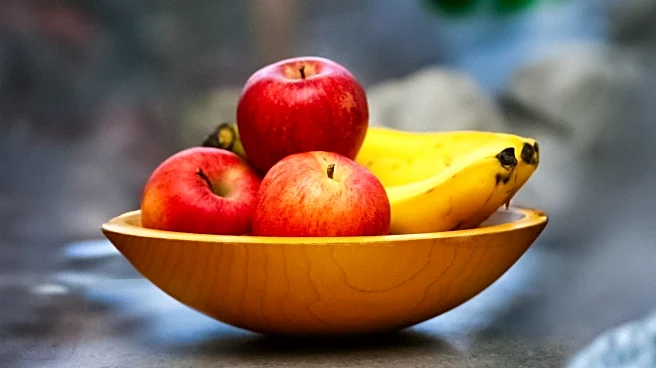What's Happening?
Fruit flies, often referred to as 'vinegar flies' due to their attraction to fermented liquids, become a common nuisance in homes during warmer months. According to Jody Green, an entomologist at the University of Nebraska-Lincoln, these pests are drawn to ripe produce and sugary substances such as soda, wine, and beer. They can breed in microhabitats like residual soda in cans or crumbs in takeout containers. Green emphasizes the importance of cleanliness to prevent infestations, suggesting regular disposal of garbage and recycling, cleaning of bins, and storing fruits and vegetables in the fridge. Additionally, using traps made of apple cider vinegar and dish soap can help manage existing infestations.
Why It's Important?
Fruit fly infestations can be more than just a minor inconvenience; they can affect the cleanliness and hygiene of homes, particularly in kitchens where food is prepared. Understanding the causes and prevention methods is crucial for homeowners to maintain a pest-free environment. The advice provided by Green highlights practical steps that can be taken to minimize the risk of infestation, which is especially important during warmer months when fruit flies breed rapidly. This information is valuable for individuals looking to protect their homes from these pests and maintain a clean living space.
What's Next?
Homeowners are encouraged to implement the preventive measures suggested by Green, such as maintaining cleanliness and using vinegar traps, to manage fruit fly populations effectively. As the weather continues to warm, vigilance in cleaning practices and proper food storage will be essential in preventing infestations. Additionally, further research and community sharing of effective methods may help in developing new strategies to combat these pests.
Beyond the Headlines
The presence of fruit flies can also serve as an indicator of broader issues related to food waste and storage practices. Addressing these infestations may prompt individuals to reconsider their habits regarding food consumption and waste management, potentially leading to more sustainable practices. Moreover, the study of fruit flies and their behavior can contribute to entomological research, offering insights into pest control and environmental health.










